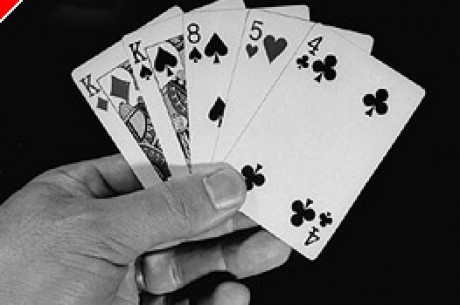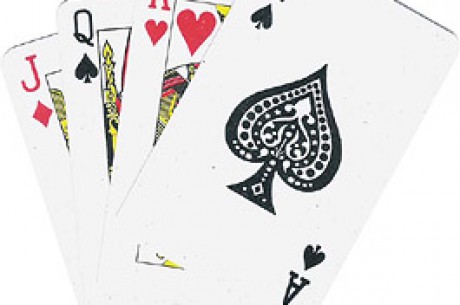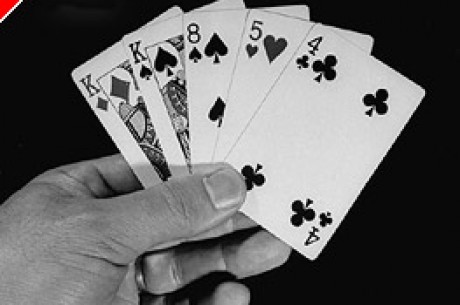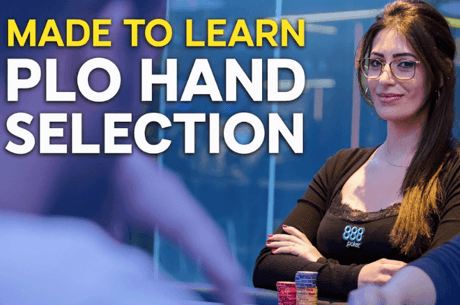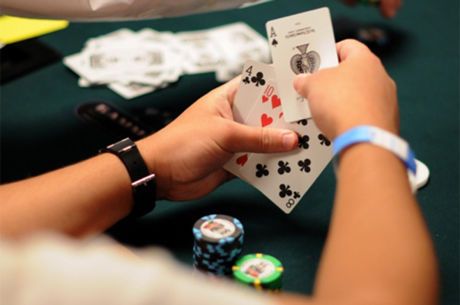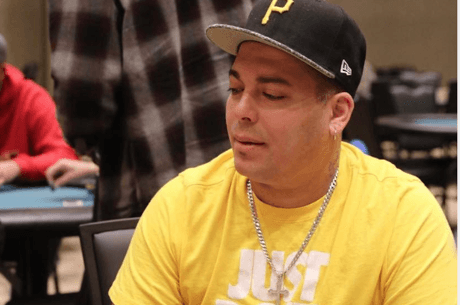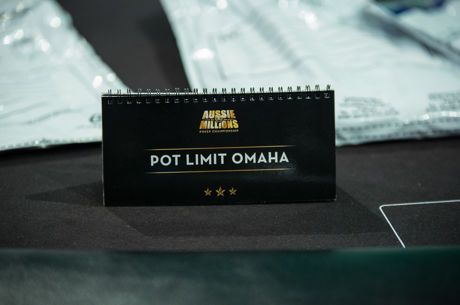Introduction to Omaha - Playing Your AA Game
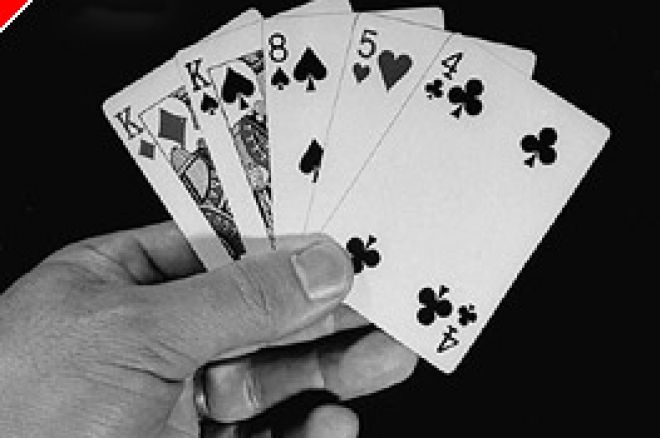
Tony is a regular on-line and card room player living in England. He mostly plays Texas Hold'em and Omaha (High and Split) at fixed, pot and no limit, at both cash and tournament tables.
Introduction
What a thrill it is playing Texas Hold'em and finding yourself casually glancing down at your hole cards to be met by two big aces staring back at you! You catch yourself wondering if your opponents noticed your eyes momentarily leave their sockets because you know this starting hand puts you in the driving seat if it is played the right way.
What about Omaha High and Omaha Hi/Lo? How do you handle aces in your hole cards in those games and what should you expect as the cards come down?
Aces High
Let's stick to Omaha High for now. Only one hand can win the pot and it has to be the highest on the poker ladder. In Omaha, especially at limit stakes at a full table, this is more often than not going to be a straight or a flush, and sometimes a full house when the community board shows a pair.
Yet, how do you feel when you pick up your four hole cards and discover AAxx? It is maybe natural to feel good. At pot limit, this can be an excuse to get all the chips in before the flop, but this is a strategy peculiar to pot limit Omaha. At limit, it may also be a good reason to raise, but let's step back for a moment.
In a limit game, I have just said that the winning hand will often be a straight or a flush. Your hole cards would therefore need to show some willing in those directions for it to be your winning hand as opposed to someone else's. This suggests coordinated hole cards like QJT9 or 9875 for straight potential, and a "double-suited" hand like Ad Ks 9d 8s for good flush potential (remembering you always need two hole cards working for you in Omaha). Unless you have double suited aces, does this suggest that two aces with random cards is in fact weak at limit Omaha where you may get several callers along for the ride all possibly drawing to a hand that easily beats a pair of aces? Let's consider a scenario:
You are "Player 1" in a five-handed game of Omaha High and receive Ad As 8c 5h. The other four hands you cannot see are a random bunch of cards:
Player 2: Th 7h 6c 2c
Player 3: Kd 9s 9d 5c
Player 4: Ah Qs 7s 4d
Player 5: Jd Td Ts 3h
Each of the hands in isolation is a weak Omaha hand with straggly cards and moderate draws, no more. All are capable of being folded by a tight player. However, in a loose limit game, the draws would be enough to tempt each player to see a flop and, with a little improvement on those cards, the turn and river. Before you realise it, your aces are up against several hands. The odds may well be against you from the outset.
Before the flop, the five hands above are statistically likely to win on a random basis, as follows:
Player 1: 15.9%
Player 2: 24.9%
Player 3: 22.0%
Player 4: 19.5%
Player 5: 16.7%
That's right, you are the dog in this hand!
Now, because you know that it is not statistically likely that many of your opponents hold nicely coordinated hands, you will want to remove as many of them from the scene as possible before the flop arrives. You can only achieve that by raising and planting seeds of doubt into their minds. The chances are that a lot of players do not know that their random assortment of cards is actually ahead of a hand like yours. Most players at lower limits continue to think "Texas Hold'em" and over-rate a pair of aces. A raise by an opponent might therefore alert them to aces and scare them away. On the other hand, you will often get called because the overriding emotion is of desire to see a flop hoping to catch good cards. Thus, at Omaha, many players make the right call for the wrong reason!
A holder of aces with random cards, in contrast, will often over-bet the hand because of its perceived value and not because of a desire to eliminate players from the pot. If anything, the player is hoping to get many callers to maximise the pot size, in the mistaken belief that he is a favourite in the hand!
Rags to Riches
Alright, let's look at the flop with all five players still active. It comes down Kh 8s 4c. You feel good because there are no obvious connectors here, no way for anyone to have a made straight, flush or full house. It is possible for someone to have made a set or a 2-pair but as it is you still have a pair of aces with possibilities for improvement. So, what are the odds now?
Player 1: 21.2%
Player 2: 25.1%
Player 3: 16.7%
Player 4: 26.1%
Player 5: 9.6%
A little better, but that is because no-one has even made a 2-pair and you cannot make that assumption with another four players still active. You still want to lose players if you can so a raise might be the best bet here given the raggy flop. You would hope that it has not improved too many hands and encourage the holders to fold before the expensive betting rounds. Had the flop been coordinated and dangerous, you would prefer a cheap look at the turn, with the others contributing, to improve your pot odds, knowing a turn card has to improve your hand or you will fold.
Say you raise and lose Players 2 and 4. Ironically, these were the two "favourites" but their hands look uninviting. Player 4 could only see a gutshot draw for an 8-high straight and two low backdoor flushes, and player 5 could see a bare pair of 4's. Of course, they do not know what poor cards everyone else has and make the reasonable assumption that they are well behind after you have raised with your aces. The other two like their pairs and "pretty-looking" cards (conveniently ignoring their dead fourth cards which do nothing for them)
The turn is Qc. It doesn't do much for you but also there are still no made hands possible beyond a set. No-one re-raised you at the flop which suggests perhaps that no-one had even one of those. Of course, the Q could make one!
You actually become a strong favourite at this point despite only having one pair but that is possibly more down to luck than judgement. Your raise eliminated some opposition and this turn card is not too bad either. You should raise again but it is never an easy thing to do in Omaha when you hold a bare pair against two opponents. The fact is you do not really know where you stand and the reason for this is that your starting hand was weak. It left you with very little to play with except the hope of making a set of aces on the flop which itself can be dangerous if accompanied by other high cards.
Conclusion
It is a statistical fact that a bare pair of aces is not the pleasant sight in Omaha that it is at Texas Hold'em. Even at the latter game, you don't want to have too many players following you to the river as you will be vulnerable to an outdraw even in that game. In limit Omaha, this is especially true.
The starting hand, AAxx, where the "xx" does not improve your chances of making a straight or better, should be treated with caution unless you can whittle down your opponents quickly. AAxx improves as a statistical advantage only when you get short-handed or heads-up before the flop. At limit Omaha, this will not happen a lot because most players will be drawing to stronger hands so you have to be ready to either get aggressive when the flop cards are not dangerous or fold when they are. For that reason, you ought to think of regarding AAxx as a good hand only when all four cards are coordinated or double-suited, ideally both. Patience is a virtue in this case.
Just to finish off, here are the pre-flop odds of the same hands as above except you hold a double-suited premium hand, Ad As Ks Qd
Player 1: 22.3%
Player 2: 33.0%
Player 3: 16.7%
Player 4: 10.1%
Player 5: 15.8%
Instead of last in line, you are second in line. Player 2 is favourite despite his collection of rags because of his straight and flush draws but that will change dramatically if the flop is bereft of 8's, 9's, clubs or hearts.
Like the lioness hunting its prey, you should wait patiently until the conditions are right to strike and you can only do this with everything in your favour before conditions change - that is before the flop. Therefore, two aces with rags for company expose you to danger. You might even consider folding them and waiting for a better opportunity, especially if you do not have position (on or just behind the button). It could save you a lot of money in the long run.
Exorcism
1 September 2005
Ed Note: Lots of Omaha action on Party Poker

